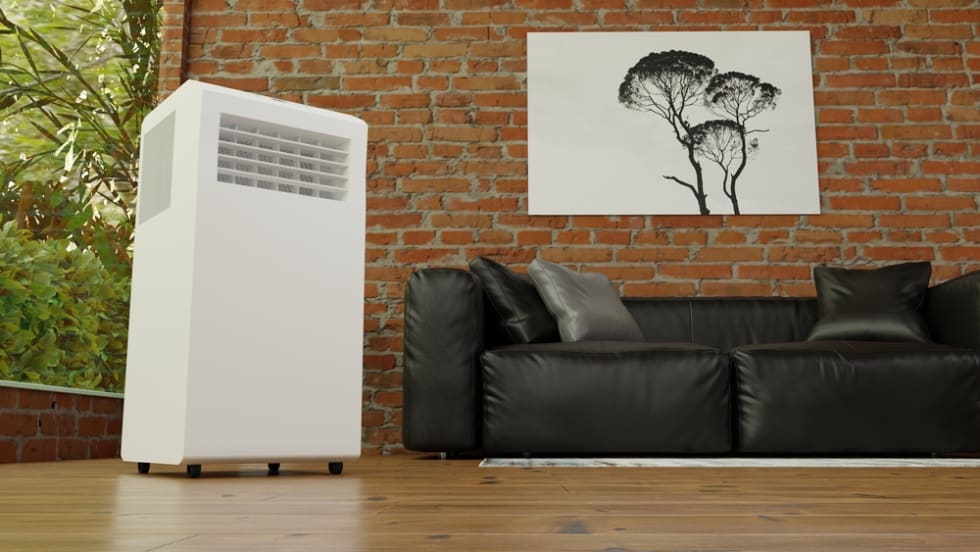South Bank at Quarry Trails
- 91 units available
- Studio • 1 bed • 2 bed • 3 bed
- Amenities
In unit laundry, Patio / balcony, Granite counters, Pet friendly, Stainless steel, Walk in closets + more

Although the winter months are all about staying warm and bundled up, the summer months bring with them a much harder struggle — staying cool.
While most apartments are required to have heating systems, there are very few situations where a landlord must provide central air or an AC, which is why central air and ACs are considered an apartment amenity rather than a necessity.
Unfortunately, renting an apartment without air conditioning or cooling systems means that you’re on your own to stay cool in the warmer months.
Upside — there are plenty of ways to cool an apartment without AC.
This guide will provide you with plenty of tips to cool an apartment without air conditioning. Let’s dive in!
To cool an apartment without AC, you’ll need to start by keeping yourself cool and then take steps to reduce the heat in your apartment.
Cooling your apartment without AC won’t be easy, but it’s possible and worth the effort if you want to enjoy a comfortable summer.
The following tricks will help you cool your apartment without using an AC.
Summer days are generally much warmer than summer nights. However, the drop in temperature goes a long way toward keeping your apartment cool.
Use the cooler temperature to help avoid inadvertently heating your apartment with heated appliances, such as ovens, dryers, dishwashers, and more.
Avoid using your oven and drying multiple loads of laundry during the day. Instead, wait until the evening’s cooler temperatures can reduce the impact of the extra heat.
Fortunately, this approach can also keep you more productive as excessive heat makes people sluggish.
While the body has several pulse points, some of the body’s most accessible pulse points include the wrists, neck, ankles, and forehead (near the temples).
Place a cold cloth or an ice pack wrapped in a towel on your pulse points to keep cool.
While you may not want to walk around with an ice pack on your head or tied to your feet, simply avoiding wearing hats and socks can help your body release excess heat.
Simple, quick, and effective - taking a cold shower is one of the best ways to cool down in the summer months.
Moreover, you don’t need to hop into freezing water. Any temperature that is comfortable and cool can feel like a spa-worthy experience.
Stay hydrated, ‘nuf said.
Staying hydrated and drinking cold water during the summer months can prevent you from overheating and experiencing illnesses related to excessive heat exposure.
Even when just relaxing in your apartment without too much physical exertion, it’s still essential to ensure that you are hydrated during the day.
If you’re not keen on water, try to dress it up with fruits, flavor packs, or anything else that will help you stay hydrated!
Said to be the preferred sleeping method of ancient Egyptians, this method of keeping cool is economical and straightforward.
Start by using a damp sheet (damp being the keyword). Think — not quite dry enough after getting out of the dryer, but not soaking wet.
Once you’ve got your damp sheet, simply place it over yourself and turn a fan on. The dampness will make the sheet feel cool once the cold air hits it.
The only downside to this method is that it requires you to wash or wet and wring out your sheets.
If you don’t have easy access to a washing and drying machine, you may want to save the DIY swamp cooler method for a super sweltering day.
Cooling sheets may sound gimmicky, but they are a worthy investment for those that want to keep summer nights as cool and comfy as possible.
Cooling sheets breathe well without trapping your body’s heat. They are generally made from cotton, microfiber, or bamboo, as these are among some of the most breathable fibers.
Additionally, these sheets boast moisture-wicking properties that can help you avoid waking up in a pool of sweat.
If you’re in the market for cooling sheets, know that they’re not cheap. However, they can be a game-changer if you find it hard to sleep comfortably during the summer months.
Upgrading to LED light bulbs might not seem like the best way to cool down your apartment, but it can make a subtle difference. Traditional halogen light bulbs produce heat. Moreover, they are far less efficient than their LED counterparts.
So, if you want to do your part in reducing your carbon footprint and cooling your apartment, making the switch to LED lightbulbs can be an easy fix. LED lights last longer than halogen lights and emit less heat with more light.
While you might keep windows closed and the curtains drawn during the day, opening windows at night is one of the best ways to cool your apartment. Moreover, it’s a great way to save money on utilities in the summer.
If you want to take the cooling to another level, invest in a window fan that you can switch from blowing to sucking.
Switch the fan on to suck out the accumulated warm air for an hour before bed, then switch it to blowing in the cool air right before bed for a cool and comfortable night’s sleep.
Warm air rises, and cool air falls. These are the basic principles that govern the choice to sleep lower to the ground. It’s also one of the reasons why apartment buildings' lowest levels are considered the best apartment floors to live on.
If possible, invest in a low platform bed with supporting slats. This will keep your bed very low to the ground. If you’re a little more adventurous, you can opt for a simple mattress on the floor.
This sleeping style has gained popularity through the years as a minimalist decor principle. However, it’s also great for those trying to keep the night sweats away.
Your ceiling fan should rotate counterclockwise for maximum coolness in the summer months.
Most ceiling fans come equipped with a small switch that changes the direction of the fan’s blades as they spin, so you can set your ceiling fan to rotate clockwise or counterclockwise.
Although this seems inconsequential, adjusting your ceiling fan can make a huge difference.
The counterclockwise rotation forces cold air down, while the clockwise rotation is designed to create an updraft, circulating the warm air in the room.
This basic life hack simply works to cool your fan’s air even further. Just be sure that any liquid or ice near your fan isn’t in any danger of being knocked off or pooling on the table. You don’t want to create a fire or shock hazard!
Keep in mind that this trick doesn't scale well. Therefore, it’s best for smaller fans cooling small areas. For example, you might consider this for the desk in your office, rather than your living room.
Blocking out the sun with curtains or blinds can help to keep your apartment cool. To maximize this effect, try blackout curtains.
Blackout curtains block out light from coming in through your windows, and as sunlight carries heat with it, they can be an effective way to reduce the amount of heat that enters your apartment.
Install blackout curtains on south-facing windows, as they tend to bring in the most light. However, your houseplants will not thank you.
While you may not want to keep all your curtains closed (hello: sunshine!), keeping the curtains closed in specific rooms throughout the day can help keep those rooms cool.
For example, if you tend not to re-enter your bedroom very often throughout the day, close your curtains when you leave the room for the day. When you return, your bedroom will be a haven of coolness.

Portable ACs are slightly different from traditional window AC units but provide the same cooling effect. These units feature a hose that connects to your window to draw in and cool air but are freestanding.
Portable AC units are popular in apartments because they don’t require any serious installation.
While portable AC units are functional and keep your apartment cool, they tend to cost more than traditional AC units, they can raise your utility bill, and they may not even be allowed by your landlord!
Here are a few things to consider when buying an AC unit.
Many landlords and property managers aren’t keen on tenants installing AC units. For one, AC units are a liability — they can drip, fall, overheat, and more.
Typically, landlords use the cost of an average utility bill to determine how much to charge for an apartment with utilities included. However, as AC units can drastically increase utility costs, they are unlikely to allow tenants to use them on the property.
Whether a portable AC (or any AC unit) is allowed should be noted within your lease agreement.
If you’ve read your lease agreement and are still unsure about whether you’re allowed to use a portable AC, reach out to your landlord for answers. It’s best to be safe rather than sorry!
If you are covering the cost of your apartment utilities and have gotten the go-ahead on the portable AC from your landlord, you’ll need to consider how the use of the appliance will impact your utility bill.
Generally, ACs are electricity sapping appliances that will certainly cause a change in your monthly utility bills.
So, if you’re in the market for a portable AC, consider energy-efficient ones and be sure to budget for the extra utility costs.
Using a portable AC can increase your carbon footprint.
Even if you aren’t the most eco-conscious of folks, the environmental impact of using a portable AC should be something to consider.
While there’s no doubt that ACs are useful, you might consider limiting your AC use and employing some of the tips and tricks listed above.
Doing so will keep your carbon footprint low and your utility bills lower.
Finding the right apartment is another way to ensure that you stay cool during the summer months. You can choose a unit with central air conditioning or opt for special non-AC-related cooling features, like a good-sized bathtub for soaking in the cool water during the warm season.
Regardless of what you’re looking for in an apartment, Apartment List can help you find it. If you’re ready to start your apartment search, we’ve got you covered.

In unit laundry, Patio / balcony, Granite counters, Pet friendly, Stainless steel, Walk in closets + more
In unit laundry, Hardwood floors, Dishwasher, 24hr maintenance, Stainless steel, Walk in closets + more